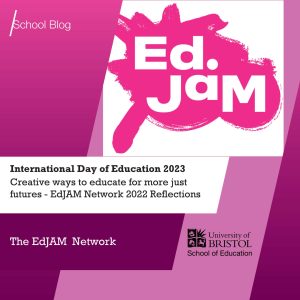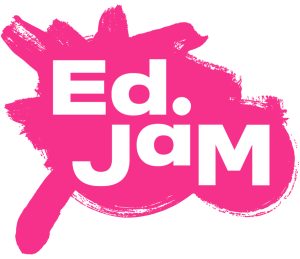 International Day of Education 2023 special blog by the EdJAM Network
International Day of Education 2023 special blog by the EdJAM Network
To acknowledge International Day of Education 2023 the Education Justice and Memory Network (EdJAM) reflects on some of our work during the past year, and the creative ways our colleagues have been teaching and learning about the violent past for more than just futures.
EdJAM Funded Projects
In Autumn 2021, we launched a call for proposals for projects based in countries on the OECD’s list Overseas Development Assistance Recipients. We received 58 applications from around the world, the quality of which was exceptional. Our budget allowed for the selection of a total of 18 projects, and this was done through a review process undertaken by EdJAM investigators and members of the Advisory Board. We welcomed our new colleagues to our network and begin working with them at the start of 2022. You can read our press release about the funded projects and explore project pages

Equalities analysis of applications to and decisions of EdJAM’s small grants call
The research funding landscape is an unequal one with funding often concentrated in the Global North, at elite institutions and with projects often led by established researchers. White male researchers are overrepresented as leaders of funded research projects, with underrepresentation of leadership from people of colour, disabled people, carers and women, non-binary and LGTBQ+ people (Adelaine et al., 2020; UKRI, 2021). Aware of this unequal landscape, we hoped EdJAM funding might, in its small way, disrupt these patterns and felt that a first step was to make the application and selection process as transparent as possible in line with our network values. Further reading is available on our application equalities analysis.
The role of heritage and everyday lives in teaching about the violent past: a discussion with Abiti Adebo Nelson and Dr. Kate Moles
In May 2022, EdJAM hosted an event with our colleagues Abiti Nelson from the Uganda National Museum and Dr Kate Moles from Cardiff University. The discussion focused on Abiti’s work with the Uganda National Museum and the National Memory and Peace Documentation Centre (NMPDC) and the development of a mobile exhibition that shares heritage objects from the Museum’s collection with communities.
How do museums and other heritage spaces shape understandings of past violence and injustice and their legacies in the present? Are there contradictions between the pedagogical and commemorative functions of heritage spaces? What is the relationship between the museum and the school? These questions and more guided our conversations around the EdJAM’s heritage and everyday lives theme. You can watch the event recording and read Tot Foster’s reflective blog.
Learning, Collaboration Evaluation Partnership (LEP) – Themed Network Event
In September 2022, the EdJAM LEP team hosted two online network meetings to support conversations between our network colleagues. The aim was to discuss what projects hope to achieve, what they have already achieved, and strategies for effective communication of their work. The events featured presentations from our colleagues in Argentina, Jamaica, Uganda, and Cambodia. To capture the English and Spanish conversations during these events we were supported by two amazing illustrators, Laura Sorvala and Niña Tigrre. These illustrations can be downloaded from our resources page .
BlogJAM Series
We launched our series of blog posts: BlogJAM! In this series we share news and reflections from projects as well as ideas that are growing across the network around approaches to teaching about past violence and injustice towards more just futures. We hope this blog series will support learning more about our projects and encourage conversations and collaborations. Use the links below to learn more.
BlogJAM: U kúuchil kaambal kuxtal: School for life
BlogJAM: The Accompong Maroon Youth Culture Camp & Memory Bank “for the born and the unborn”.
BlogJAM: Graphics to decolonize memory, project launch and creative labs
BlogJAM: Intimate Cartographies in Community 2022
BlogJAM: Tales of Justice and Renewal: EdJAM Latinoamérica
BlogJAM: Abia narratives of hope through trauma aesthetics
BlogJaM: Mosqoy: Our Dream of a More Inclusive Peru

Publications
Several academic publications and book chapters have also been written by our network investigators and collaborators. The two articles linked below are already available on our website in English and Spanish. More open access publications will be available on our resources page in the coming months.
Education as site of memory: developing a research agenda
Ethical research landscapes in fragile and conflict-affected contexts: understanding the challenges
UNESCO policy guide: Dealing with violent pasts through education
Earlier this year, EdJAM’s Principal Investigator, Professor Julia Paulson was commissioned by the UNESCO team who work on Genocide and Holocaust Education to write this policy guide. Julia, together with Dr. Michelle Bellino and many EdJAM colleagues, are developing a new UNESCO policy guide on addressing violent pasts through education. It will be a high-level guide for policy makers in Ministries of Education. The UNESCO team are keen to learn from and work with EdJAM and to include case studies of EdJAM projects. This policy guide will be a new standard setting document in many ways and is due to be published in 2023.
Resources
Our colleagues have created recourses which are available to browse on our resources page. Below are just two examples:
EdJAM Pakistan Children’s Series
The EdJAM Children’s Series is a collection of illustrated books for children designed by undergraduate students and illustrators to highlight historical and contemporary narratives that are missing from textbooks in Pakistan.
The project resulted in 11 topics that have been translated across 22 booklets into Urdu, English, Sindhi and Balochi. These are open access and available on our resources page as free downloadable resources for parents and teachers.
CARGO Movement
There is now an online course available on FutureLearn to support teachers and home educators to use CARGO curriculum content. This course is a collaboration between the University of Bristol, CARGO Movement and EdJAM.
Learn more and join the FutureLearn course here: https://www.futurelearn.com/courses/practical-skills-for-teaching-inclusive-history-cargo-classroom
There will be more news to share from across our international network, including collaborations, online events and regional visits with our Global South colleagues, which are planned for 2023.
 Learn more about EdJAM Network and access more of our free educational resources on our website here
Learn more about EdJAM Network and access more of our free educational resources on our website here
